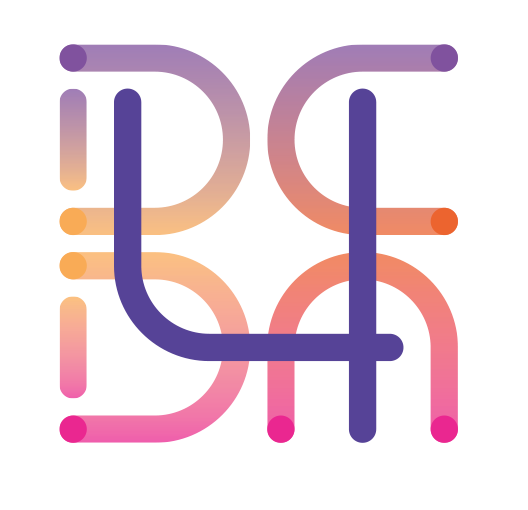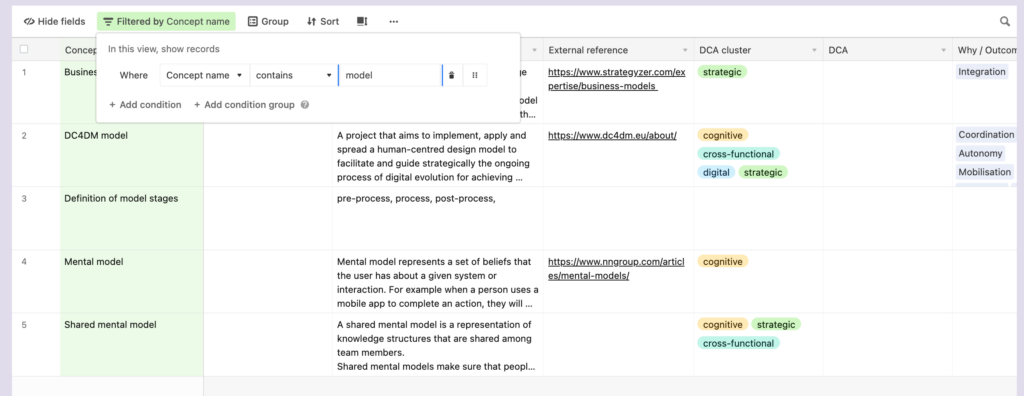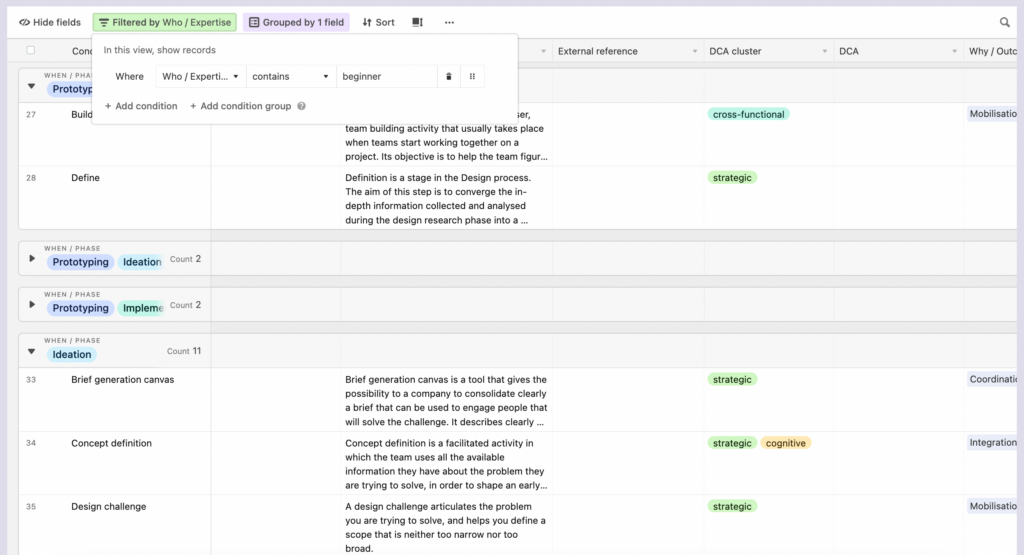#4 Tools for digital maturity: the DC4DM Vocabulary
The fourth issue our newsletter looks at one of the tools we’ve developed as part of our Digital Maturity set of digital artefacts: the Digital Maturity Vocabulary.
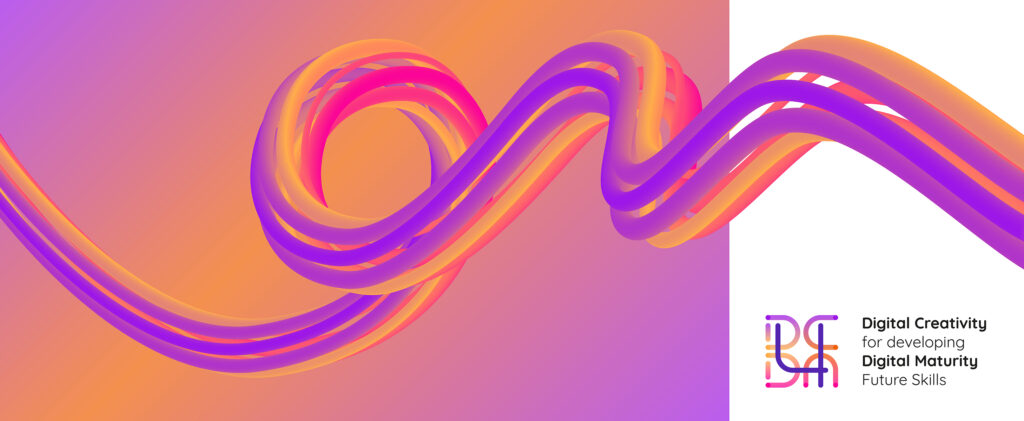
Digital Creativity for developing Digital Maturity Future Skills (DC4DM Project) is an EU-funded initiative that brings together partners from Italy, France and Portugal in an effort to foster a new culture of creativity in digital innovation.
Over the next two years, the team consisting of design, digital and innovation specialists from Politecnico Di Milano, Startup Madeira, Mines Saint Etienne, Universidade da Madeira, and Université Jean Monnet Saint Etienne will create a new programme for helping students and startups to put creativity at the service of new digital technologies. Our goal is to create and implement a human-centred design model to facilitate and guide the ever-evolving process of digitalisation through the enhancement of creative skills.
You can freely access and play around with the DC4DM Vocabulary here. Below we explain how we built it and the various ways in which you can use it.
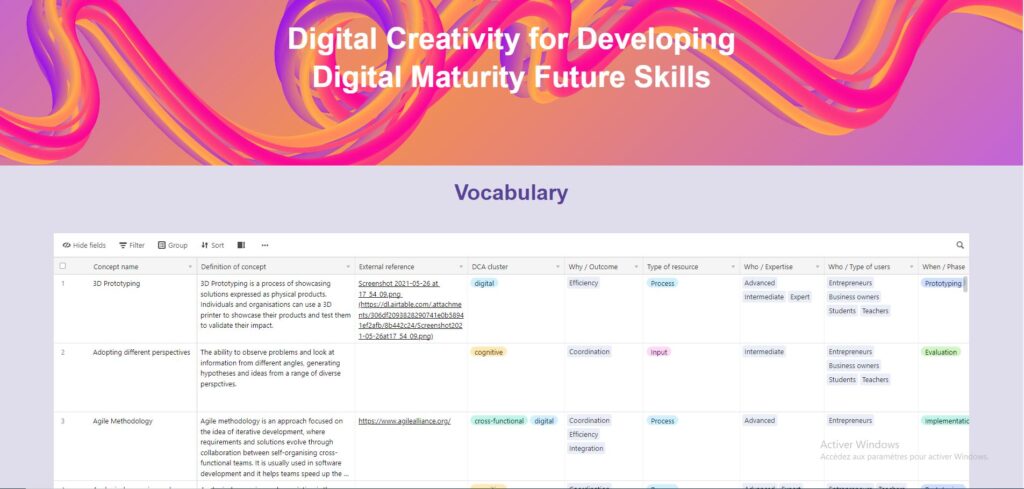
Why a Digital Maturity Vocabulary?
The purpose of building a Vocabulary as part of our array of tools was to catalog all those terms that will help the future users of DC4DM Edu Box understand it, use it and obtain results from it. Building and disseminating a common vocabulary with the participants int he DC4DM activities is necessary in order to:
Encourage fast engagement across people who do not know each other by laying out capabilities and align expectations.
Define a joint process and move from one activity to another efficiently
Help create a shared understanding of the problem, solution and the outcome.
Help evaluate the results of the work under the same standards.
Vocabulary contents
While the contents of the Vocabulary for Digital Maturity will continue evolving together with the project and the use of the EDU Box, the first iteration contains a set of terms and concepts gathered through two approaches:
Inside-out: starting from the terms and concept of the DC4DM model (such as the Digital Creative Abilities or DCAs, that we touched upon in our previous issue of the newsletter), defining each one in a way that is relevant to the DC4DM objectives.
Outside-in: by looking at existing glossaries in the space of digital transformation, digital consultancy and digital education and including relevant external references.
As such, we have identified 3 categories of terms that need to be included in the DC4DM vocabulary :
Terms that describe inputs – the conditions, ingredients (skills, capabilities) that are prerequisites to the proposed process. Here the focus is to define “ingredients” in a way that is sufficiently universal, but culturally appropriate, in order for as many people as possible to identify easily with the skills / capabilities necessary as input,
Workshopping terms – concepts from our model that need to be applied in workshops. Here the focus would be to describe them in an actionable way, so that during workshops or work sessions both facilitators and participants can easily follow through and interpret the actions that are expected of them
Terms that explain outputs – those concepts that make up what we call digital maturity, and that help evaluate the level of accomplishment of digital maturity.
DC4DM Vocabulary taxonomy
In order to make the vocabulary into a flexible tool, easy for any user to search, filter and pull out the terms they need to work with, we’ve developed a tagging system that contains a number of taxonomies.
By the DCAs (Digital Creative Abilities) it reflects or are relevant to:
Cognitive
Digital
Cross-functional team
Strategic vision
Hierarchical, by level of user’s expertise
Beginner
Intermediate
Advanced
Expert
Methodological, by phases of the process:
Inputs
Process
Outputs
Consequential, by the action it enables
Mobilisation
Coordination
Acceleration
and by the expected impact when applied in practice:
Access
Efficiency
Autonomy
Integration / Alliance
The result: a self-service, iterative tool
The DC4DM Vocabulary is a tool that allows for easy, self-service approach. Each person can retrieve a set of terms that are relevant to a phase of a project they are working on, to their level of expertise, or to the type of DCA they are trying to enhance.
This is done by simply searching for a keyword:
By applying personalised filtering to the terms:
Or by simultaneously applying filters and groupings:
